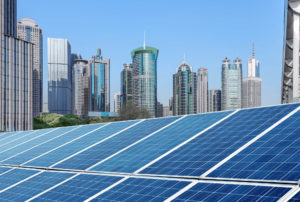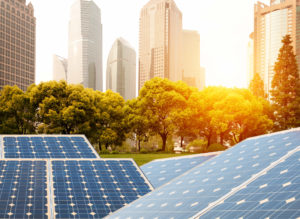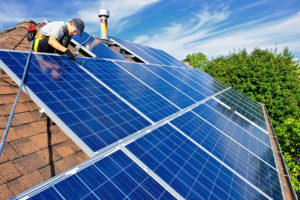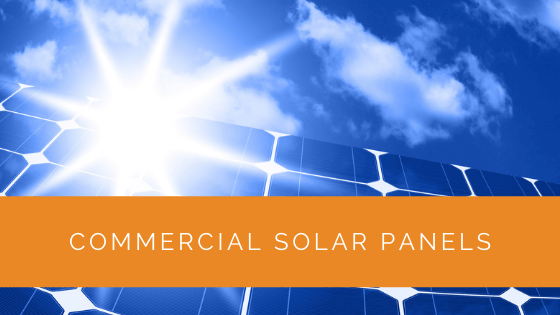Solar panels are being used in domestic sectors and have become a part of commercial sectors. Businesses want to reduce carbon emissions by shifting to a cleaner energy source. They are installing solar panels, which benefit the environment and help reduce electricity costs.
There are many benefits to installing solar panels for businesses. If you wish to install solar panels for your commercial building, you will need to know the process inside-out.
The guide provides you with information about solar panels for the commercial sector. It also focuses on the pros and cons of installing a solar panel system for your commercial building.
Contents
- 1 Key Takeaways
- 2 Why You Should Use a Commercial Solar Panel
- 3 How Much Does a Commercial Solar Panel Cost?
- 4 Solar Panels for Businesses: Financing Options
- 5 Do You Need Planning Permission for a Commercial Solar PV?
- 6 Are There Any Maintenance Costs?
- 7 Benefits of Commercial Solar Panel
- 8 Drawbacks of a Commercial Solar Panel
- 9 Case Study: Implementing Commercial Solar Panels for a Manufacturing Facility
- 10 Expert Insights From Our Solar Panel Installers About Commercial Solar Panels
- 11 Discover the Power of Solar with Solar Panels Network
- 12 Final Thoughts
Key Takeaways
- Installing commercial solar panels can help businesses reduce their carbon footprint, save on electricity costs, and even generate extra income by selling excess energy back to the grid.
- The cost of commercial solar panels varies based on factors like roof size, energy requirement, and location. Still, businesses can expect to pay between £16,000 to £70,000, with an approximate cost of £1000 per kilowatt.
- While there are no ongoing government grants for commercial solar panels in the UK, businesses can still benefit from past programs like the Feed-In Tariff (FiT) and the Smart Export Guarantee (SEG), as well as other financing options such as Salix Funding for the public sector. Additionally, businesses no longer need planning permission for most solar panel installations.
Why You Should Use a Commercial Solar Panel
Installing solar panels for your business can help reduce your carbon footprint and save money yearly. It does not matter if your business is small or large; commercial solar panel installation benefits.
A business would mostly be active during the day, which makes using solar power an ideal factor. The solar energy produced by the solar panels will be directly supplied to the business. You can also pair a battery storage system with your solar array.
One of the major benefits of using solar panels for your business is saving major costs every year. The lifespan of a solar panel is around 25 years, which can save around thousands of pounds.
You can see the excess energy back to the grid through solar panel installation. This would incur extra income for your business and compensate for the installation costs. Moreover, switching to solar power shows that your business supports sustainable and green energy practices.
How Much Does a Commercial Solar Panel Cost?
The cost of a solar panel varies depending on several factors. Ideally, solar panels used for businesses cost between £16,000-£70,000. This is for small to medium-sized businesses.
Some factors that influence the costs of solar panels are the roof size, energy requirement, number of electrical applications used, etc.
You can determine if solar panels are feasible for your business by checking your company’s energy consumption every month. This can be found in your utility bill, showing the per kWh costs and how much kWh of electricity you consume monthly.
Approximately small to medium-sized businesses use about 30,000 to 50,000 kWh every year. However, this will also vary depending on the location of your business, solar system size, and business energy consumption.
If you have a small business, you can get the idea by estimating household solar panels. The costs for household solar panels are almost the same as for small businesses.
An approximate calculation for the cost of business solar panels would be £1000 per kilowatt.
The business will also have to pay installation costs apart from the cost of the components. The main components you would need are solar panels and inverters. The installation costs will also increase or decrease depending on the size of the solar panel system.

Solar Panels for Businesses: Financing Options
The UK government has no ongoing grants or financing options for business solar panels. However, some grants have existed in the past. Businesses that are registered to these options can still enjoy the benefits.
Feed-In Tariff
A feed-in tariff (FiT) is a government grant for commercial and domestic users. However, this grant is no longer operational since it was closed for new applications in March 2019.
Businesses already registered to the FiT grant can receive income from this. According to this grant, energy companies must pay a tariff based on each unit of their electricity generated. The energy company will also export the excess energy back to the grid and pay an export tariff on the unused energy by the business.
The company will receive payment per kilowatt of electricity back to the grid. However, there is a limit to the amount of energy they can sell back.
Smart Export Guarantee (SEG)
Another grant that existed in January 2020 is the Smart Export Guarantee grant. Businesses can benefit financially by returning the excess solar energy to the national grid. However, the business should have a smart meter to measure the exported power to be eligible for the grant.
Solar Panel Funding
You can get other solar funding options if you belong to the public sector. One example is Salix Funding, which offers interest-free capital to businesses installing energy-efficient technologies.
Salix is government-owned and funded by the Department of Education, the Scottish Government, the Department of Business, the Welsh Government, and the Energy and Industrial Strategy (BEIS).
Do You Need Planning Permission for a Commercial Solar PV?
Planning permission was necessary for commercial properties until 2012 but not for domestic ones. However, from 6 April 2012 onwards, this criterion was also lifted.
Both commercial and domestic properties no longer require planning permission to install solar panels. However, this is for systems that generate up to 50 KWP electricity and thermal up to 45 kilowatts.
Commercial properties that are present in a listed building will require planning permission. This is the only exception to the permission rule.
If you are confused about whether planning permission is required, ask the contracting company. They will carry forward the process for you and take all the permissions on behalf of your business.
You should always be fully informed before signing any contracts. This will keep you in the loop about what the contract states and what type of permissions you require or don’t. Choosing the right contracting company that can adequately guide you is also important.
Are There Any Maintenance Costs?
The best thing about solar panels is they require little to no maintenance. Hence, there are no extravagant maintenance costs involved.
The only complicated part of solar panels is the installation process. After the installation, you will not have to worry about your solar panels for 25 to 30 years.
You will only need to book the services of a professional examiner who will check your solar panels every five to six years. The solar panels should be kept clean at all times to work efficiently.
Anyone can do this maintenance, and it does not require any professional expertise. The cleaner must ensure no debris or dust accumulates on the solar panels. However, if the commercial building is too high and hard to reach, you might need the assistance of a professional cleaner.

Benefits of Commercial Solar Panel
Using solar energy for your business has several benefits. Installing solar panel systems gives you an income opportunity and makes your business energy efficient.
Below are the benefits of a solar panel for your business.
Reduces Utility Costs
The energy you receive from your commercial solar PV will cost much less than what you pay to your utility companies. You might save only a small amount every kilowatt, but eventually, the total would be large.
Another great thing is the cost of maintenance of solar panels in the UK is considerably low. Therefore, your overall expenses behind the solar panels will remain low.
High Efficiency
Solar panels for commercial properties help in making everyday operations more efficient. The standard efficiency of solar panels is around 15% to 20%. However, the efficiency can go up to 42% depending on the solar panels.
The solar panels for commercial rooftops are not the same, so variations in types and efficiency will differ.
There are three types of solar panels with varying efficiency ratings. Monocrystalline solar panels are the most efficient, made from a single piece of silicon. However, due to their high-efficiency level, they are also very expensive.
Another type of solar panel is the polycrystalline panel. They are less efficient than monocrystalline solar panels. However, they are much more affordable and are made from multiple silicon pieces.
The least efficient solar panel is the thin-film solar panel. They need the most space and offer the least energy efficiency from all three solar panels.
Before making your investment in solar panels, you need to see which will give you the most benefit in the long term.
Financial Savings
A great benefit of solar panel installation for companies is you have a grant income potential. Even though there are changes in the exporting rates, companies can get additional revenue through the SEG grant. Moreover, you will be able to save money on your electric bills.
Even with the FiT no longer being functional, any suppliers are providing rates similar to this grant. With this, you can make higher savings on your solar panel system. Additionally, several tax reliefs make solar PV system installation attractive to businesses.
Produce Green Energy
The best thing about installing a solar PV system for your business is you reduce your carbon footprint. This is a renewable energy that produces clean and green energy. You will not be contributing to the increase in environmental carbon footprint.
Non-renewable energy sources lead to carbon emissions, which can harm the environment. This increases the carbon footprint, harming future generations in the long term. With solar energy, you will create a sustainable and safer environment for everyone. The positive environmental changes will be beneficial for society to a great extent.
Drawbacks of a Commercial Solar Panel
A commercial solar panel has several benefits, but that does not mean it is without any drawbacks. The drawbacks of business solar panels are mentioned below,
Expensive Initial Cost
Solar panels save energy costs and give high ROI (return on investment) in the long run, but the initial investment is very high. You will have to provide upfront money for the installation process.
That said, it is important to know that the break-even for commercial panels is very quick compared to domestic panels. This is mainly because commercial panels generate more electricity in a very short time.
Dependent on Weather
Another major drawback of a solar PV system is its dependency on the weather. The solar cells convert sunlight into electricity; hence, direct exposure to sunlight is necessary.
If the weather condition is poor, the efficiency of the solar PV system will decline. This means the efficiency will be compromised if it is cloudy, extremely sunny, or snowy. It is also crucial to remember that overexposure to sunlight can be bad for the system. This leads to overheating the solar panels, damaging the solar cells.
Due to this disadvantage, you might not get consistent energy conversion throughout the year. However, solar panels can produce energy even during winter or when there is indirect sunlight. Hence, the solar PV system will still be functional.

Case Study: Implementing Commercial Solar Panels for a Manufacturing Facility
Background
A medium-sized manufacturing facility in Buckinghamshire approached Solar Panels Network to reduce their energy costs and enhance their sustainability profile. The facility had substantial daytime electricity usage, making it an ideal candidate for a solar panel installation. The primary goals were to cut down on electricity bills, reduce the company’s carbon footprint, and demonstrate a commitment to sustainable business practices.
Project Overview
The project aimed to install a commercial solar panel system capable of offsetting a significant portion of the facility’s energy consumption. The solution needed to be scalable to accommodate future growth and energy needs. The facility’s management also expressed interest in taking advantage of the Smart Export Guarantee (SEG) to sell excess electricity back to the grid.
Implementation
- Energy Consumption Analysis: Conducted a comprehensive review of the facility’s energy bills and peak usage times to determine the necessary system size.
- Site Assessment: Performed a detailed survey of the available roof space and assessed potential shading from nearby structures and trees.
- System Design: Designed a 250 kW solar panel system using high-efficiency monocrystalline panels to maximise energy output and savings.
- Installation:
- Scaffolding Setup: Ensured safe and efficient installation by setting up scaffolding around the facility.
- Mounting and Wiring: Installed the solar panels and connected them to the facility’s electrical system, ensuring optimal positioning for sunlight exposure.
- Inverter and Battery Setup: Integrated inverters and a battery storage system to manage energy distribution and store excess power.
- Grid Connection: Connected the system to the grid, enabling the facility to benefit from the SEG by selling surplus electricity.
Results
- Energy Savings: The solar panel system generated enough electricity to cover 70% of the facility’s energy needs, leading to significant reductions in monthly electricity bills.
- Return on Investment: The facility projected a payback period of approximately 5-7 years, with substantial savings accumulating beyond that point.
- Environmental Impact: The installation reduced the facility’s carbon footprint by over 300 tonnes of CO2 annually, aligning with their corporate social responsibility goals.
- Operational Efficiency: The system’s integration with the facility’s operations improved energy management, providing a reliable and clean energy source.
Summary
The successful installation of commercial solar panels at the manufacturing facility exemplifies the benefits of renewable energy adoption in the business sector. The project not only achieved substantial cost savings and reduced environmental impact but also enhanced the company’s reputation as a forward-thinking and eco-friendly business. This case study highlights the potential of commercial solar panels to provide financial and environmental benefits, making them an attractive option for businesses across various industries.
Expert Insights From Our Solar Panel Installers About Commercial Solar Panels
Commercial solar panels are an excellent investment for businesses looking to cut down on operational costs. The savings on electricity bills can be substantial, and the system typically pays for itself within a few years.
Lead Solar Technician
Investing in commercial solar panels is a smart way to showcase a company’s commitment to sustainability. Not only do they reduce the carbon footprint, but they also appeal to eco-conscious consumers and partners.
Renewable Energy Consultant
The initial cost of installing commercial solar panels may seem high, but the long-term financial benefits and government incentives, like the Smart Export Guarantee, make it a worthwhile investment for any business.
Senior Solar Installer
Discover the Power of Solar with Solar Panels Network
Are you navigating the world of solar installations? Look no further than Solar Panels Network, the UK’s trusted partner in harnessing the sun’s potential. Our dedication goes beyond just installations; we’re on a mission to transform how homeowners and businesses across the UK perceive and utilise energy. By choosing us, you’re reducing your carbon footprint and making a smart financial move that promises savings for years ahead. Contact us today and embark on your solar journey.
Final Thoughts
Sunlight is renewable energy that helps generate solar energy for running different electrical appliances. Solar power is not just restricted to households but is used in commercial sectors as well.
Before you go for the solar installation, you need to check the roof space of your commercial building. The roof space will help you determine the number and type of solar panels you need.
Solar power contributes to cost savings of energy prices and makes you independent from the utility system. You will also greatly impact the environment by opting for green and clean energy.
If you wish to go for solar installation in your business, it is best to contact a professional installer. The installer will guide you on the right path and choose the correct solar PV system for your business.
With the right solar system, you can make a huge change to your business efficiency and get interesting financial benefits that would not have been possible with the utility system.
About the Author
Solar Panels Network stands at the forefront of solar energy solutions, driven by a team of seasoned solar engineers and energy consultants. With over decades of experience in delivering high-quality solar installations and maintenance, we are committed to promoting sustainable energy through customer-centric, tailored solutions. Our articles reflect this commitment, crafted collaboratively by experts to provide accurate, up-to-date insights into solar technology, ensuring our readers are well-informed and empowered in their solar energy decisions.

